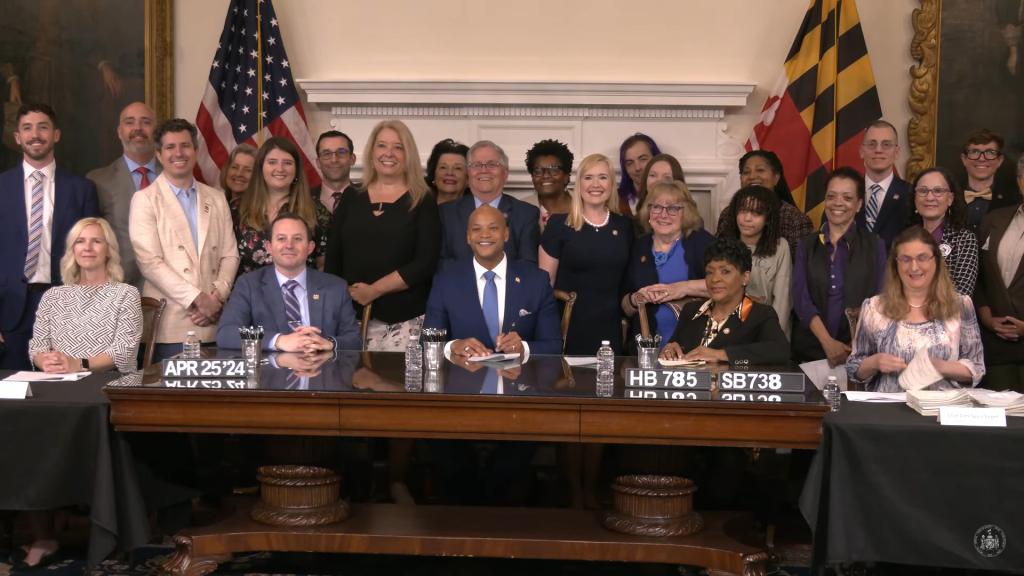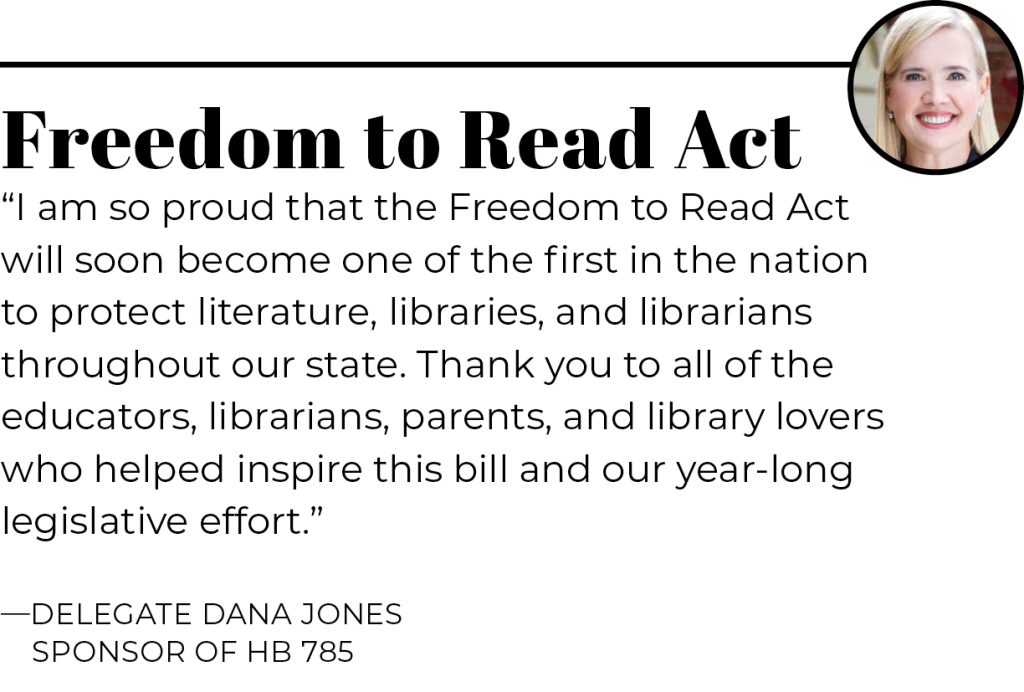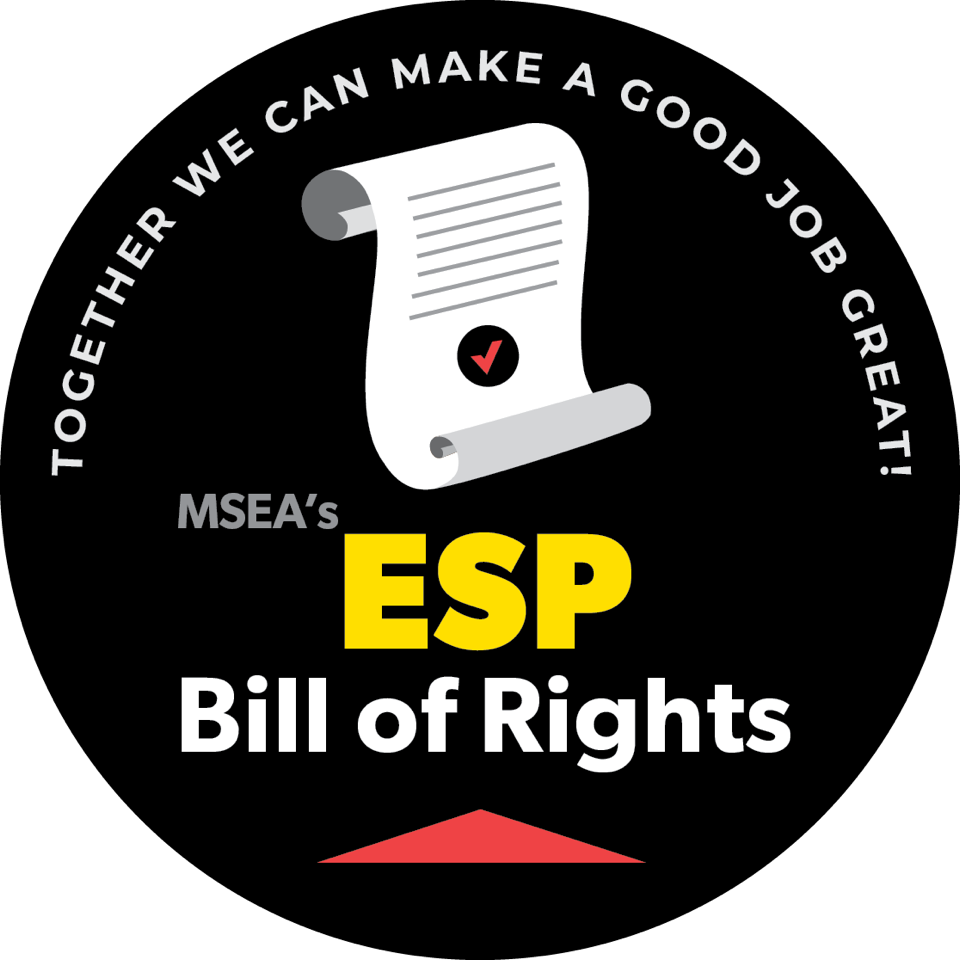General Assembly
MSEA Tackled the Educator Shortage, Privatization, Budget Challenges, and More

A Big Lift Throughout the 90-day session, MSEA’s lobbyists tracked approximately 400 pieces of legislation and provided testimony on 150. While most of MSEA’s legislative priorities passed, other bills did not cross the finish line but raised awareness on critical topics that impact educators and students daily. We also worked successfully to prevent the passage of some bills that would have set back hard-won gains that support all students, such as bills to redirect public school funding to private schools.

Saying NO! to Book Bans With a welcome nod to the professional judgment of educators, and the teaching of an honest and accurate history, legislators passed Senate Bill 738/House Bill 785, the Freedom to Read Act. The legislation, sponsored by Del. Dana Jones (D-Anne Arundel) and Sen. Nancy King (D-Montgomery), will protect school and public libraries from politicized attacks and extremist activists who have attempted to ban books across the state. Legislators received nearly 8,000 emails from educators urging passage of the bill.

The bill positions Maryland as a leader in defending the professional judgment of educators in vetting and selecting books and limiting rampant attempts to ban books, often fomented by fringe national groups. MSEA President Cheryl Bost testified to legislators, “From Carroll County to Montgomery County, Maryland has not been immune to book bans and curriculum challenges. Beyond the direct impact of these restrictions, implemented or simply proposed, is a widespread chilling effect on school and library content that should alarm everyone who wants students to have a high-quality and complete learning experience.”

See MSEA’s new Pathways to Licensure package of explainers here.
New Pathways to the Classroom One piece of solving the complicated educator shortage puzzle is to attract and retain a corps of professionals who can meet both the traditional and current challenges of the job. Research shows that a public-school workforce should be well prepared through a rigorous educator prep program and that reflects the diverse demographics of our communities. This year, MSEA helped introduce exciting legislation that opens doors for education majors, conditionally certified educators, and educators with out of state licenses who want to teach in Maryland by creating more options to become a classroom teacher.
House Bill 945/Senate Bill 771, sponsored by retired teacher Del. Eric Ebersole (D-Baltimore County) and Sen. Mary Washington (D-Baltimore City and County), gives more options to achieve certification. Now educators can take fewer standardized Praxis tests if they have a grade point average of 3.0 or above, or three years of effective evaluations, or completed an induction program. The traditional Praxis pathway is still in place, but with these new options, Maryland can keep standards high while welcoming more of the highly skilled and educated professionals our students need. The legislation had support from the Maryland Association of Boards of Education and the State Board of Education.
Who’s representing you in the General Assembly? Find out here.

Growing Our Own—The ESP to Teacher Pathway House Bill 1157/Senate Bill 937, sponsored by Del. Jheanelle Wilkins (D-Montgomery) and Sen. Malcolm Augustine (D-Prince George’s), establishes the Grow Your Own Educators Grant Program, long considered by MSEA to be an essential piece of a successful strategy to build the educator workforce. The program would provide grants to local school systems for certain teacher candidates’ expenses and program administration costs. Local school systems, employee organizations (like MSEA or a local union), and approved teacher preparation programs can apply through the Maryland State Department of Education (MSDE) for grants. This means more opportunities for paraeducators and ESP who are interested in moving into teaching positions.
“Studies suggest that education support professionals who become teachers are more effective and more likely to remain in the classroom than teachers prepared through other pathways,” Bost said, underscoring the dual benefits of Grow Your Own programs. “Supporting ESP who are interested in becoming teachers will help Maryland meet our goal of diversifying the profession and may also improve teacher retention.”
To be eligible, a teacher candidate applicant must be employed as a non-certified education support professional or provisional teacher by a participating local school system and meet certain educational requirements.

Also creating more opportunities for aspiring educators is Senate Bill 377/House Bill 75, sponsored by Del. Eric Ebersole (D-Baltimore County) and Sen. Nancy King (D-Montgomery). The bill builds on 2023 legislation that established initial and internship stipends for students at some community colleges and four-year colleges. Now, aspiring educators at any state community college can apply for stipends which help students support their studies. Testifying in support of the bill was aspiring educator Asia Lee, a recent graduate of Towson University, who spoke of the difficult burden some aspiring educators carry on their path to graduation. “Balancing my classes, my internship, and my job proved challenging for me. I had to make sacrifices at my job and cut back on days at work to fulfill the requirements of the internship.”
Respecting Pre-K Educators’ Experience Every educator knows that for both parents and schools, access to high quality pre-k programs is a strategy that works, but the Blueprint requirement for credentialing providers was proving burdensome. With too few private pre-k programs, the newly required credential of an associate’s degree by the 2027–2028 school year meant programs across the state could lose educators with a proven track record but who lacked the time or resources to pursue the additional degree.
A solution offered by House Bill 1441, sponsored by Del. Vanessa Atterbeary (D-Howard), now exempts pre-k paraeducators in public programs from the requirement if they have at least five years of experience in a publicly funded pre-k classroom by July 1, 2024. This reform honors the experience of educators and helps retention efforts.
Standing up to Privatization Trends There’s more work to do in the fight against the privatization of support staff jobs. MSEA’s Responsible Contracting bill, Senate Bill 1043/House Bill 1175, sponsored by Del. Jessica Feldmark (D-Howard) and Sen. Dawn Gile (D-Anne Arundel), didn’t pass this year, but we know that success depends on continued education about support staff jobs as well as our own stubborn commitment to passage. Employees need the guardrails the legislation would impose and more transparency around the use of subcontractors at public schools.

The annual ESP Lobby Night brought members from across the state to advocate for the bill plus dozens more from partnering unions like AFSCME and SEIU.
MSEA is fighting threats of privatization using the ESP Bill of Rights! Read it here and join the campaign for a living wage, fairness, and respect for all support staff.
Improving the Online IEP System MSEA supported legislation by Del. April Miller (R-Frederick), House Bill 1237, that would have established a task force to study the Maryland Online IEP System (MOIEP). MOIEP has received harsh criticism from many special educators for its usability challenges. The bill passed the House unanimously but did not advance in the Senate. MSDE submitted testimony indicating that its Blueprint Special Education Workgroup will consider MOIEP performance issues and make recommendations. MSEA will be vigilant to gauge MSDE’s progress and ensure that the voices of special educators are at the table as changes are considered.
Supporting Students in Poverty A recent poll found that 81% of Marylanders are finding housing less affordable, and 72% see a role for state government to improve the conditions. Enter the Rental Assistance for Community School Families Program, House Bill 428/Senate Bill 370, sponsored by Del. Vaughn Stewart (D-Montgomery) and Sen. Shelly Hettleman (D-Baltimore County). The legislation will help community school families keep stable housing by establishing a rental assistance fund. The General Assembly added $10 million into the FY25 budget to fund the program. This means fewer children in community schools will experience the trauma of becoming unhoused, leaving their friends, or falling behind due to absence.
Strong Budget for K-12; Some Community College Funding Restored Gov. Moore and legislators fully funded the Blueprint, Maryland’s school funding formula, as the state continues to meet its commitment to students while some counties try to undercut their local commitments to schools. These funds will support strong contracts and pay increases as well as further expanding community schools, career and technical education, and pre-k.
The Blueprint recognizes community colleges as an important economic and academic engine, providing credentialed workers, degreed students, and dual enrollment for ambitious high schoolers. Cuts of $22 million for community colleges in Gov. Moore’s proposed budget and a formula change which would reduce state funding in future years was an unexpected blow. In the end, $10 million was restored and the formula change was eased.
Testimony from community college faculty helped lead the fight to restore the cuts, including that of Eric Fons, an associate professor at Anne Arundel Community College, who testified: “Community colleges serve such a wide variety of students, all of whom are trying to improve their lives in various ways.”
“For our students to be successful, educator voices must be at the table and at the forefront of decisions impacting our schools,” said Bost. “That’s why it’s so important for members to show up and make sure legislators understand how policies impact classrooms and students. I appreciate every educator who took time to raise their voices on important issues and helped win progress for our students and schools. Our voices matter—and must be heard.”

